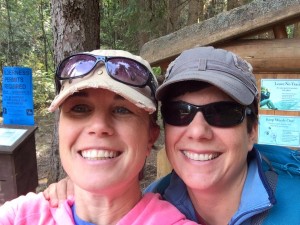On a recent trip to Eastern Oregon, I met a lesbian couple, Stef and Liz, living in this part of the state their entire lives. Their story echoed many of those heard on that trip, which illustrated the challenges of being out in rural, small towns, and the impact that has on community and family.
Tell us about what you do, about your family, and how you became a couple.
Stef: Liz and I were both married to men when we met over 11 years ago. I was pregnant at the time (with my youngest of my three), and Liz had three kids. I vividly remember the moment we first met. Liz was dropping her youngest son off at a preschool I was volunteering at—I was very struck by her—and we eventually became close friends.
I grew up having “same-sex” attractions, but believed they were wrong, sinful, and something that—through enough faith and effort—could be overcome. As the years went by, I tried numerous methods to rid myself of my attractions, including prayer, counseling, exorcism, books, and tears. Eventually, I came to a breaking point, admitting to myself that whatever “gay” meant, I was that.
That led to the most difficult part of my life. I came out to myself, my husband, family, and friends. Soon after, my church community found out, which meant so did our entire community. This process was so unbearable that my lifelong struggle with suicidal ideation grew worse. I felt a tremendous amount of loss—of my faith, friends, family, home—compounded with an incredible fear of losing my kids.
When I came out to Liz, she told me she always had feelings for me. Through of ups and downs, we eventually ended up together in Wallowa County. This was difficult because of the loss of community both of us experienced, so we decided the best thing to do was to leave Wallowa County. The farthest we could go was Union because of our divorce agreements and not wanting the kids to be far from their dads. We hoped we could re-build our lives together, finding stability for our kids.
In many ways we accomplished our original goals. We merged our families and found new freedom in being open about who we really were.
What brought you to Eastern Oregon? Can you tell me what it’s like to be an out couple with a family there? What do you like about living in rural Oregon?
Moving to a new community in Union meant enrolling the kids in a new school—everyone would find out about the lesbian-headed family in town.
At first, I thought accepting families would befriend us. It became painfully obvious that that wasn’t going to happen and I dreaded school functions. We found that very few people would speak to us or even acknowledge our presence.
Ultimately, we decided that the best thing for our family would be to leave Union and move back to Joseph in Wallowa County. The kids have more family there, and Joseph is much more accepting than Union. We’ve been in Joseph since last summer and are still adjusting.
I worry about running into people from my past—it’s been a challenge—but, honestly, I’ve been surprised by how welcoming people have been.
When Pride Foundation hosted a community meeting in La Grande last spring, you had a sobering answer about the impact of Oregon’s marriage equality victory in your community–would you mind sharing it again?
I feel like marriage equality had no impact on our local community. Liz and I were married shortly after it became legal in Oregon, to absolutely no fanfare or congratulations. In Union, our former community, LGBTQ people are still feared, shunned, and afraid to be out. The passage of marriage equality does not make us “more legitimate” in many people’s eyes; it affirms their fear that this change is being forced on them.
What are some of the biggest obstacles facing your community? Either your immediate family and community, or the broader LGBTQ community in Eastern Oregon?
Many LGBTQ people are not ‘out’. They are somewhere between ‘out’ and ‘just don’t talk about it.’
It can be extremely difficult for new people moving here to find community. People feel isolated and long for a deeper sense of connection. Many of the LGBTQ people I’ve spoken to in the past four years have either moved or plan to move to Western Oregon soon.
Right now, I’m working to connect with LGBTQ people living in Wallowa County. I’m asking about their experiences living in rural Oregon and what they would like to see happen, if anything. We’ve heard about LGBTQ youth who have experienced bullying in school but have had little support or protection from the administration. We’re trying to connect with them, too, through a Facebook group I started for LGBTQ people living in Eastern Oregon.
It’s hard to do outreach in rural communities, so I’m hopeful that Pride Foundation will give us something to connect around. I’m looking forward to working together to develop strategies for building community and helping the broader community see LGBTQ people as neighbors and friends, and not people to fear.
Katie Carter is Pride Foundation’s Regional Development Organizer in Oregon. Email Katie.
